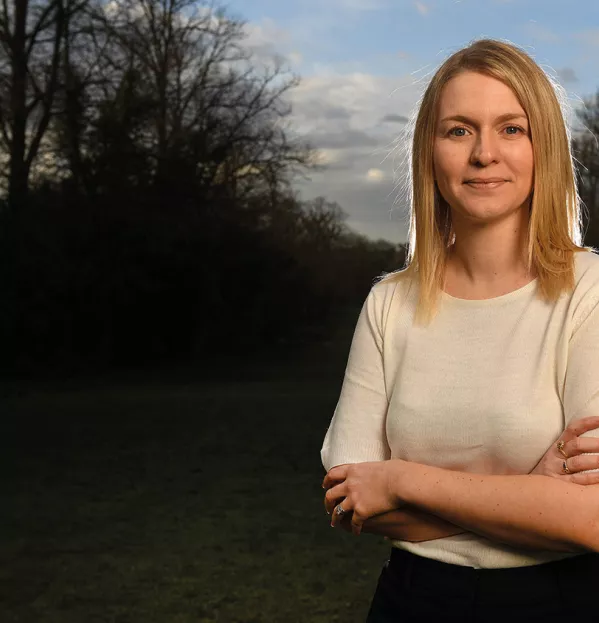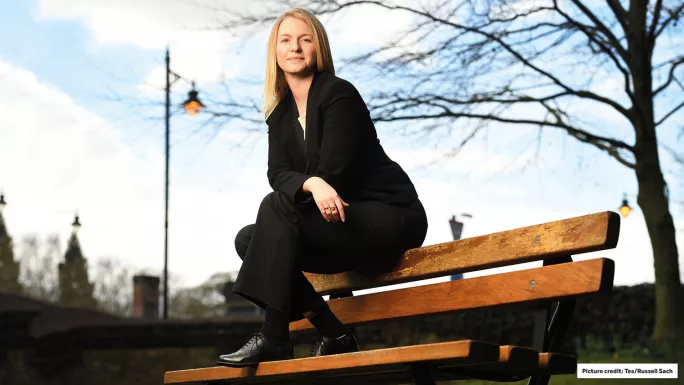‘If you say that you’re a teacher, people just feel sorry for you’

Emma Hollis has taken over as the voice of school-based teacher trainers just as the government seems to have woken up to the scale of the recruitment and retention crisis.
“It absolutely is a crisis,” says Hollis, executive director of the National Association of School-Based Teacher Trainers (NASBTT). “And I don’t think, this year, that can be denied. Applications are 23 per cent down on last year, which was a bad year.”
In the past few months, Nick Gibb, the school standards minister, has written to universities and schools, telling initial teacher training (ITT) providers to “maximise recruitment”, and Ofsted has said it will be checking that they do.
The rules around the skills test have been relaxed and a consultation on improving induction - a key part of keeping teachers in the profession - has just closed.
But Hollis, 37, who worked for two years in the control room of Thames Valley Police, is used to keeping her cool in emergency situations - and has little time for waffle.
“It very much feels as if [the government] are in listening mode,” she says. “Although, outwardly, they may not have been admitting a crisis, they are taking steps to try to change things - and that’s a really positive thing.
“Where it’s not helpful is where you still get quotes like, ‘We’ve got more teachers than ever,’ which just feels unhelpful. Yes, we have, in raw numbers, but compared to how many we need, we don’t have enough.”
She has a teacher’s knack of being polite but persistent. She has seen hundreds of eager trainees starting out on their chosen career, keen to make a difference to children’s lives. And she has seen some falter at the “cliff edge” - three years in, when they are overwhelmed by the demands of the job.
Her story demonstrates how tricky it can be to get into teaching - and, without support, how increasingly difficult it is to stay in.
Hollis spent her young childhood shuttling between her mother’s home in Pinner, Middlesex, and father’s home in Aylesbury, Buckinghamshire, after her parents split. Then, when she was 10, a recession hit and her mother and stepfather were forced to move permanently to what had been their holiday home in Spain.
“It was not really a desperately bad way to grow up,” Hollis says. “There were a lot of swimming pools and sunshine.”
She attended an English school and flew back during the holidays, alone, to see her dad in England. She took her GCSEs in Spain, but came back to England for A levels, rather than taking the International Baccalaureate.
She began a law degree, but left after a year. After a few temporary jobs, she decided to return to studying. This time, she took a psychology degree with the Open University, while she worked in the police control room.
“I learned from the law degree that I really needed to do something that interested me in order to be successful,” she says. “Psychology fascinated me and I did some child psychology units - that’s what started the spark [for teaching]. It was something I wanted to do.”
She completed the degree - but now, married and with a mortgage, she just couldn’t afford another year out to train as a teacher. So she started work with a London market research firm - commuting 90 minutes each way from her home in Buckinghamshire.
After her daughter, Isabella, was born in 2008, she wanted a job nearer to home and then she spotted an advert in the local paper for a salaried teacher training course run by the Two Mile Ash Initial Teacher Training Partnership in Milton Keynes, one of the country’s most long-standing school-centered initial teacher training providers (Scitts).
“It was not a big salary but it meant I could continue to pay the mortgage,” she says. “I couldn’t have done it any other way. And it was an amazing experience.”

She now backs the planned introduction of teaching apprenticeships for people without a degree - a stance she admits is controversial. Hollis thinks that the opportunity to earn a degree while training would help to bring people into teaching who are not catered for by existing routes, especially in “cold spot” areas where it has proved hard to recruit teachers. “I expect it would attract career-changers without a degree,” she says. “It would not solve the recruitment crisis, but it could help in some areas, and it has real potential. Like Teach First, it would be a niche route, attracting a particular person who otherwise would not go into the profession.”
What she is less keen on, however, is the government’s talk about “maximising recruitment”. And she warns that a recent change, telling providers that they must assess entrants’ suitability to train to teach, rather than their suitability to teach, could have unintended consequences.
“Even if you know that a person is not suitable to teach, they could be suitable to train with no prospect of going into employment,” she says. “They are asking us to do something slightly different.
“Someone who is suitable to be on a training programme is not necessarily the same as someone who is suitable to be a teacher.”
But there is a more fundamental concern - how does this move make the profession more attractive? “I don’t see how it does,” says Hollis. “We don’t want to be seen as a profession that is easy to get into - it should be a high bar.”
Once she had found her way into teaching, Hollis threw herself into the role. Her first job as an NQT was at St Thomas Aquinas Catholic Primary in Bletchley, Buckinghamshire, as a Year 6 teacher. “It was very flattering, that they were prepared to trust me with such an important year,” she says. “And I had trained in Year 6, so it was what I knew. I loved that age range; the children are getting independent and have that sense of swagger.”
She started out limiting herself to one hour of work in the evening - but then took a day to mark or prepare lessons at the weekend. And it was her daughter who made her realise that she could not continue at that pace. One day she was playing with Isabella, and asked her to come and look at something.
“I can’t do that,” replied Isabella. “I’m too busy doing my marking.”
Hollis decided that she needed to scale back - and applied for a part-time job back at Two Mile Ash. “The conversation around teaching has really changed,” she says. “When I started teaching, people who were not teachers would talk about the long holidays. Now, if you say you’re a teacher, they say you work really hard - you see them feeling sorry for you.”
At Two Mile Ash, Hollis became involved in pastoral support for trainees - urging them to see the job as a marathon not a sprint. And she then rapidly progressed up the career ladder until in 2015 she became head of the Milton Keynes teaching school alliance and head of educational strategy for Inspiring Futures Through Learning multi-academy trust.
“I do believe, genuinely, it is the best job in the world,” she says. “But that discourse [of workload] is now filtering through, and that is why we are not attracting people.”
She also became a trustee at NASBTT, which represents the vast majority of Scitts, and was appointed executive director in September, when her predecessor, Martin Thompson, retired.
It has been a turbulent time for teacher training, which successive education secretaries have fiddled with. There has been a vast expansion of school-based training, an ITT curriculum review, several changes to the way places are allocated and, most recently, proposals to “strengthen QTS and improve career progression”.
Hollis supports the government’s proposals to extend the induction period after QTS from one to two years, but is unhappy about plans to change the name of the qualifications so that at the end of initial training, teachers would get “QTS (provisional)” rather than QTS. For graduates leaving university with several years of debt, she says, facing a further three years before being qualified to teach will feel “momentous” and could put people off altogether. But she feels that a longer, supported induction period could “100 per cent” help with retention.
However, what would really help, she says, is a pledge to slow down on curriculum and exam changes, to allow teachers to feel that it is possible to “get on top” of things - something that, after she spoke to Tes, education secretary Damian Hinds has promised.
Hollis believes that moves to support candidates while they train and allow them to teach once they’ve qualified will make the profession more attractive - but offering quick wins and warm words without fixing the underlying strains will not.
Tackling the teacher recruitment and retention crisis is not a simple task.
It is going to need a concerted effort, an abundance of ideas and system leaders who are straight-talking, creative and aspirational. Like Hollis. Like teachers.
You need a Tes subscription to read this article
Subscribe now to read this article and get other subscriber-only content:
- Unlimited access to all Tes magazine content
- Exclusive subscriber-only stories
- Award-winning email newsletters
Already a subscriber? Log in
You need a subscription to read this article
Subscribe now to read this article and get other subscriber-only content, including:
- Unlimited access to all Tes magazine content
- Exclusive subscriber-only stories
- Award-winning email newsletters